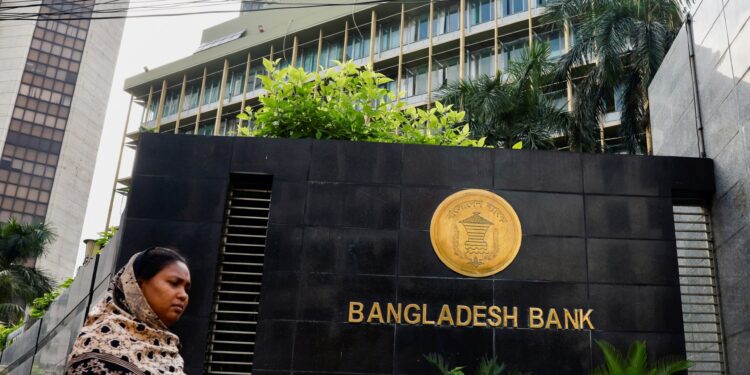Bangladesh’s new central bank governor, Ahsan Mansoor, has accused businessmen linked to the ousted regime of Sheikh Hasina of working with members of the country’s powerful military intelligence agency to steal $17 billion from the banking sector during her rule.
The British Financial Times quoted Mansoor, who was appointed governor of the Bangladesh Bank after Sheikh Hasina fled the country last August, as saying that military intelligence helped seize leading banks in the country.
He added that about two trillion taka ($16.7 billion) were taken out of Bangladesh after the seizure of bank funds through methods such as loans to their new shareholders and large import invoices.
“The biggest robbery”
He continued, “This is the largest bank robbery according to any international standards. This did not happen on this scale anywhere. It was sponsored by the state and would not have happened had the intelligence men not placed guns on the heads of (former bank CEOs).”
The governor said that the founder and president of the S-Alam Industrial Group, Muhammad Saif Alam, and his partners “embezzled” at least $10 billion from the banking system after taking control of the banks with the help of military intelligence, adding, “They were giving themselves loans every day.” .
In a statement on behalf of Saif Alam, the law firm Quinn Emanuel Urquhart & Sullivan said that the S Alam Group reported that Mansoor’s allegations were “baseless.”
She added, “The coordinated campaign launched by the interim government against the S Alam Group and many other leading companies in Bangladesh failed to respect even the basic principles of due process. This has actually undermined investor confidence and contributed to the deterioration of law and order. Looking at the group’s record and contributions, we find the accusations “The governor’s directive was surprising and unjustified.”
The Bangladesh Armed Forces did not respond to a request for comment from the Financial Times.
Sheikh Hasina had controlled power for two decades in Bangladesh, which has a population of 170 million and the second largest exporter of clothing in the world, but her rule was marred by accusations of vote tampering, the imprisonment and torture of opponents, and rampant corruption. The former prime minister fled to India last August, and it is not known. Its current location.
Money back
The interim government headed by Nobel Peace Prize laureate Muhammad Yunus, which took power after Sheikh Hasina’s escape, has repeatedly pledged to recover funds it claims were embezzled by members of the regime and their associates.
Mansour, a former International Monetary Fund official, said last month that he had requested Britain’s help to investigate the fortunes of Sheikh Hasina’s allies abroad, and that board members of leading banks were being targeted under her rule.
According to Mansour, intelligence officials kidnapped members of the banks’ boards of directors from their homes, transported them to other places, including hotels, and told them “at gunpoint” to sell all their shares in the banks (to Mr. S. Alam) and resign from their positions as directors, adding, “They did this in one bank after another.” “.
The British newspaper quoted a former CEO of a bank as saying that he was forced to resign from his position as part of a forced takeover. Mohammad Abdul Mannan, former chief executive of Bangladesh Islami Bank, one of the country’s largest banks, said he had been under pressure from “people associated with the then government” since 2013.
This included pressure to recruit board members at the suggestion of the Prime Minister’s Office and a search by “persons associated with government agencies” of a hotel room used by one of the bank’s foreign directors.
Forced concession
Abdul Mannan said that while on his way to a board meeting in January 2017, he was taken to meet a senior defense official, then detained for an entire workday to force him to resign.
“They prepared bank letters on fake papers,” said Abdul Mannan, who was appointed head of First Security Islamic Bank by the central bank in September. “I had to sign a resignation letter.”
The S Alam Group has diversified its banking activities over the past decade, and the group’s website says it has “significant investments” in 7 banks, including Islamic Bank Bangladesh and First Security Islamic Bank.
Mansoor said Bangladesh aims to recover the stolen money after completing an audit of about 12 mostly bankrupt banks that were seized during Sheikh Hasina’s rule.
“We want to use this review as evidence in the court of law at the international and domestic level,” the governor said.
The interim government in Bangladesh moved to prevent the sale of shares in banks after the collapse of Sheikh Hasina’s regime, and Mansour said that the authorities are now planning to sell shares in banks to “good national or international strategic investors”, in order to refinance them, and the central bank also intends to establish an asset management company, To manage or dispose of non-performing assets of banks.
He said Bangladesh would also seek to recover the money taken out of the country by hiring international law firms to try to seize assets held by bank shareholders in Dubai, Singapore, Britain or elsewhere.



